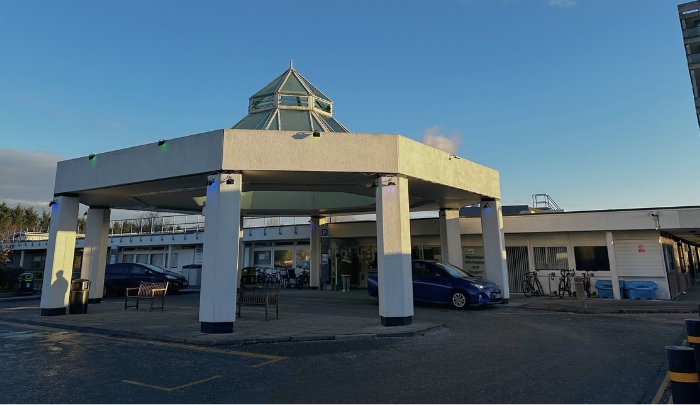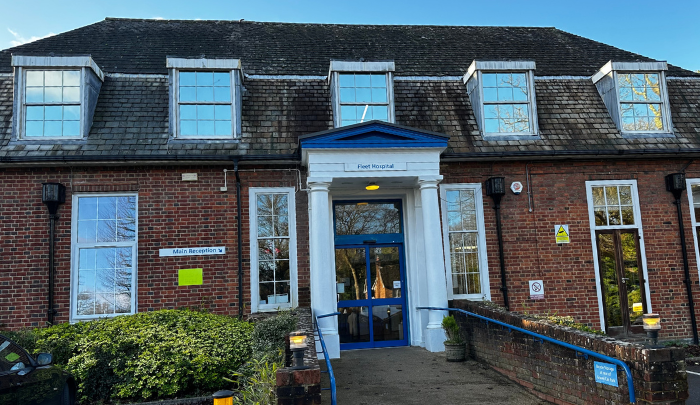Orthotics (surgical appliances) is the prescription, manufacture and fitting of externally worn devices used to modify the structural and functional characteristics of the neuro-muscular and skeletal system.
The orthotic service at Frimley Health mainly involves supplying and fitting orthopaedic footwear, splints, callipers, surgical supports and wigs.
We offer outpatient clinics at Wexham Park Hospital and Fleet Hospital.
Referrals and appointments to the surgical appliance department can be made in the following way:
New patient referrals
New patient referrals are accepted from the following sources:
The orthotics department will then make an appointment to see an orthotist to assess the patient. Depending on the condition and type of treatment required, you may need to see the orthotist a number of times.
If a patient requires items such as a wrist brace or hosiery an appointment may be made to see an appliance assistant.
Re-referral or return patients
Re-referral or return patients will be offered an appointment providing:
If the patient does not meet the criteria above they must be re-referred via the route for new patients.
All patients who receive an appliance should be reviewed by their consultant to ensure treatment is effective.
Non attendance
If you are not able to attend an appointment please contact us as early as possible to re-arrange it.
Patients who do not turn up for their appointment without contacting us will be treated as follows:
- Hospital consultant or specialist team
- GPs (some referrals for specialised orthotics need a consultant review)
- They have been seen by an orthotist/appliance assistant within the previous year.
- They are undergoing continuing care with a Frimley Health consultant.
- A new patient who does not attend their appointment will be discharged. A letter will be sent to the referring consultant/GP informing them of this.
- A follow up patient with two consecutive non-attendances without explanation will be discharged and not offered a new appointment. A letter will be sent to the referring consultant/GP to let them know.
Following your orthotic appointment you may need to wear an appliance (orthosis). The trust uses a number of suppliers and manufacturers to make, adapt or supply the appropriate appliance for your condition. This involves sharing certain patient information with manufacturers and suppliers who may be based in a country outside of the EEA.
The Trust presumes that by continuing with your treatment you consent for the sharing of information. If you have any queries about this, please speak to the relevant site appliance assistant.
Patients may be seen by either an orthotist or a surgical appliance assistant who will ensure that the right appliance is issued for the patient’s condition. People referred for wigs will be assessed by an external specialist wig maker who will make the most suitable wig. This may be located outside of the hospital premises.
Below is a list of other appliances issued by the surgical appliance department and an indication of how frequently they may be changed.
- Adult footwear – Patient to have two pairs of shoes in good condition. One pair issued at a time.
- Children’s footwear – one pair of footwear replaced when needed.
- Footwear repairs – only carried out if a complex adaptation to the heel or sole has been made. Patient must bring in shoes to be repaired and come in to collect once completed.
- Footwear adaptations – patients will need to provide their own footwear. Two pairs of shoes in the first year, followed by one pair a year will be adapted.
- Footwear raises – two pairs of shoes in the first year, followed by one pair a year will be raised.
- Adults and paediatric insoles – one pair of insoles will be provided.
- Insole repair – no fixed time for renewal of insoles, they will be reviewed and replaced when necessary.
- Adult and paediatric callipers – one pair of callipers fitted and provided.
- Adult and paediatric splints/AFOs – one pair of splints/AFOs provided.
- Splints/AFOs repairs – please contact the department if your appliance needs repair or replacement.
- Knee braces, adult and paediatric – One knee brace or pair of braces fitted and supplied at any one time. Long-term users will be supplied with a replacement brace when their current brace is beyond economical repair.
- Wrist supports – patients will be provided with one (bilateral if required).
- Collar – patients will be provided with one soft or hard collar.
- Fabric supports* – two fabric supports will be fitted and supplied.
- Spinal supports* – one plastic spinal orthosis will be fitted and supplied.
- Elastic hosiery *– two pairs of elastic stockings or tights will be supplied. If a further supply is needed, patients will be advised to visit their GP to obtain a prescription, after which patients can go to any chemist to obtain their orthoses. Following the initial appointment, the patient will be sent a letter detailing patient compression required.
- Wigs* – alopecia patients may be supplied with two acrylic wigs initially then one annually as required. Other patients may be supplied with one acrylic wig annually as required. Note human hair wigs are not normally prescribed.
- Helmets – two will be supplied
*Items may incur a prescription charge.
Please note all of the above surgical appliances will not be replaced unless the original referrer is consulted for their agreement. For long standing provision, the orthotist will request patients get a clinical review from a doctor or relevant healthcare professional at least every two years.
Prescription charges (April 2017)
Wigs and fabric supports
Wigs and supports are available from the NHS but patients will be charged for them unless they qualify for help with other charges. Many people can get support with NHS prescription charges and other health costs such as wigs.
Prescription charges are as follows:
| Chargeable item | Cost per prescription |
|---|---|
| Surgical stockings / hosiery | £17.20 |
| Abdominal or spinal support | £44.55 |
|
Stock modacrylic wig If patients choose a non stock wig there may be an additional charge on top of the prescription charge. |
£72.80 |
| Partial human hair wig | £192.85 |
| Full bespoke human hair wig | £282.70 |
You can get free wigs and fabric supports if you:
- Are under 16
- Are 16-18 and in full time education
- Are a hospital inpatient
- Are a war pensioner and the wig or fabric support is for your accepted disablement and you have a valid war pension exemption certificate
If you or your partner – including civil partner – receive, or you are under the age of 20 and the dependant of someone receiving:
- Income support
- Income-based jobseeker’s allowance, or
- Income related employment and support allowance
- Pension credit guarantee credit
- Universal credit (and meet the criteria)
If you are entitled to or named on:
- A valid NHS tax credit exemption certificate – if you don’t have a certificate, you can show your award notice; you qualify if you get Child Tax Credits, Working Tax Credits with a disability element (or both) and have income for tax credit purposes of £15,276 or less
- A valid NHS certificate for full help with health costs (HC2)
People named on an NHS certificate for partial help with health costs (HC3) may also get help.
If patients choose a non stock wig there may be an additional charge on top of the prescription charge.
Frequently asked questions
If you have a low income the NHS Low Income Scheme (LIS) may help you. To apply for an HC2 certificate, you should complete form HC1 available from Jobcentre Plus offices or most NHS hospitals. Your doctor, dentist or optician may have one too. You can also get an HC1 by calling 0300 123 0849.
You will qualify for a full help HC2 certificate (which includes free NHS prescriptions) if your income is less than or equal to your requirements, or your income is greater than your requirements by no more than half the current English prescription charge.
You will qualify for a limited help HC3 certificate if your income is greater than your requirements by more than half the current English prescription charge. The HC3 certificate shows how much you have to pay towards your health costs.
Certificates are usually valid for six months to five years, depending on your circumstances.
Tell the person who fits your wig or fabric support that you are entitled to it free, and show proof of your entitlement or war pension exemption certificate.
You might also be entitled to help with charges if you have a valid HC3 certificate. You are only asked to pay the amount stated on the certificate or the actual cost – whichever is the least.
Ask the hospital for a receipt that shows that you have paid an NHS charge, and complete form HC5 (W) – claim wigs and fabric supports.
Further information is also available from the NHS Business Services Authority (NHSBSA) web page or by calling the customer enquiry line on 0300 330 1343.
NHS Low Income Scheme helpline – 0300 330 1343
Prescription services helpline – 0300 330 1349
Queries about medical exemption certificates – 0300 330 1341
Queries about prescription prepayment certificates (PPCs) – 0300 330 1341
Queries about tax credit certificates – 0300 330 1347
Call 0300 123 0849 to order a paper copy of the HC12, HC5 and HC1 (SC) forms
Call 0300 330 1343 for all other queries
More information
-

Wexham Park Hospital
Address:
Wexham
Slough
SL2 4HL -

Fleet Hospital
Address:
Church Road
Fleet
GU51 4LZ
